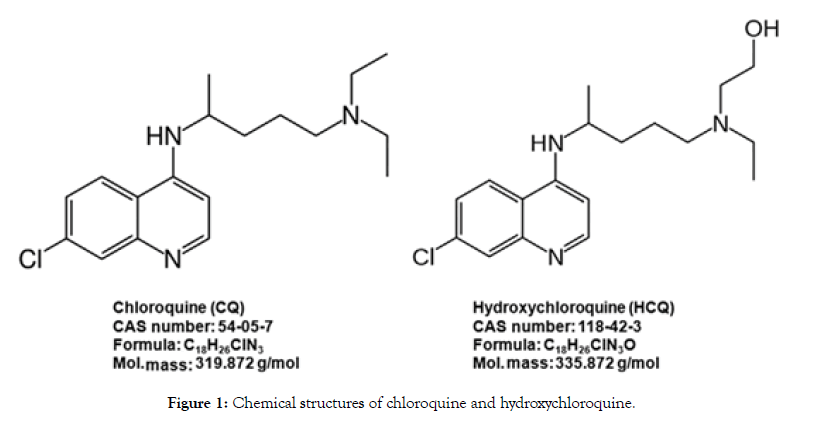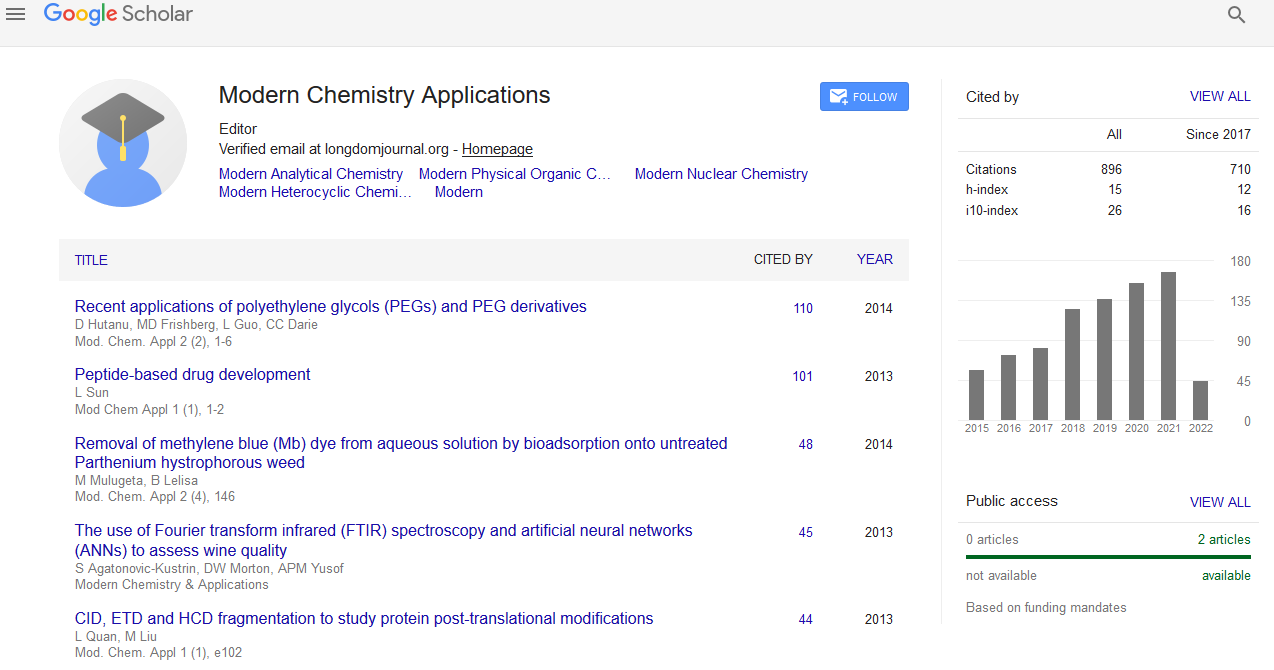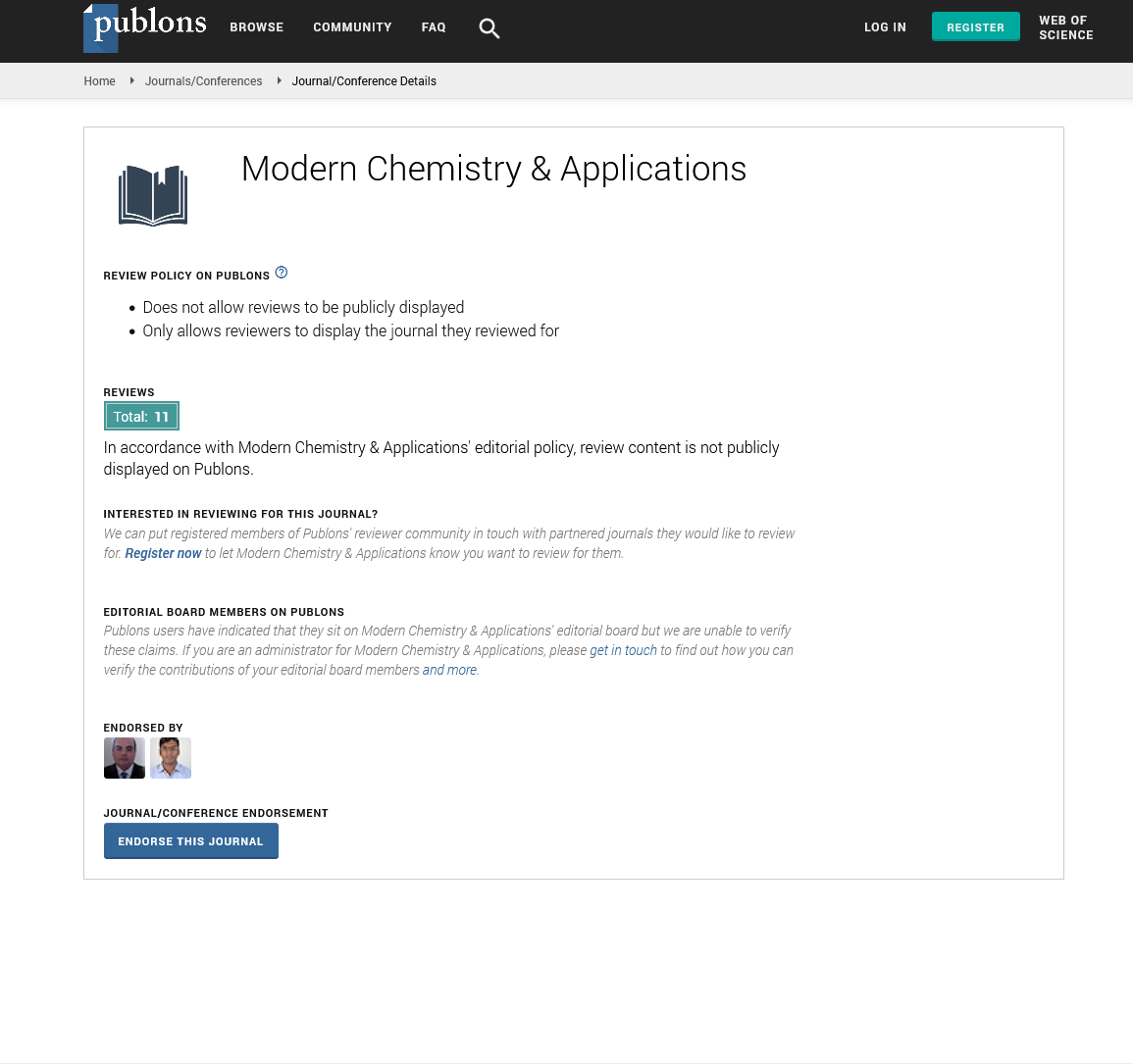Indexed In
- Open J Gate
- JournalTOCs
- RefSeek
- Hamdard University
- EBSCO A-Z
- OCLC- WorldCat
- Scholarsteer
- Publons
- Geneva Foundation for Medical Education and Research
- Google Scholar
Useful Links
Share This Page
Journal Flyer

Open Access Journals
- Agri and Aquaculture
- Biochemistry
- Bioinformatics & Systems Biology
- Business & Management
- Chemistry
- Clinical Sciences
- Engineering
- Food & Nutrition
- General Science
- Genetics & Molecular Biology
- Immunology & Microbiology
- Medical Sciences
- Neuroscience & Psychology
- Nursing & Health Care
- Pharmaceutical Sciences
Review Article - (2020) Volume 8, Issue 4
The Importance of Hydroxychloroquine in the Fight Against COVID-19
Hani Amir Aouissi*Received: 31-Aug-2020 Published: 21-Sep-2020, DOI: 10.35248/2329-6798.20.8.277
Abstract
The novel coronavirus (COVID-19) epidemic caused a lot of human damage, as of August 07, more than 19 million cases and almost 713000 related deaths are noted. Since there is no efficient vaccine, the alternative that divided opinions for a long time is an old medicine called hydroxychloquine. The aim of this study is to synthesize the different highlights of the most important studies published in the last months. After a precise study of the available bibliography dealing with this subject and the addition of an adapted example, which is the current situation of Algeria, we concluded that in brief, given the inexistence of a better solution, this protocol must be applied in view of its effectiveness, while waiting for the vaccine.
Keywords
COVID-19; Hydroxychloroquine; Epidemiology; Algeria
Introduction
Some attribute the invention of hydroxychloroquine (HCQ) in 1934 to the famous "Prafulla Chandra Ray" known as the father of Indian chemistry. Others claim that it was synthesized in the late 1940s [1]. The most important point, however, is that chloroquine (CQ) and hydroxychloroquine (HCQ) are old drugs that have proven effective in the past, particularly in the treatment of malaria. Chloroquine and hydroxychloroquine are synthetic molecules developed from cinchona and are soluble in water (HCQ is more soluble due to the presence of a hydroxyl group-OH) (Figure 1) [2]. HCQ is primarily a less toxic derivative of chloroquine known to be effective in inhibiting infection due to SARS-CoV-2 in vitro [3]. In summary, this is an even safer alternative [4]. In addition, several studies have suggested that it could prevent endocytosis, among others [5,6]. According to the CDC (Centers for Disease Control and Prevention), the HCQ was always included in the list of essential drugs [7] the side effects had been known for a long time as nausea and diarrhea or occasional vomiting.

Figure 1: Chemical structures of chloroquine and hydroxychloroquine.
Literature Review
This study will come back point by point on the various articles that were for and against this protocol, while giving our opinion by informing on the actual situation of Algeria, which will support our opinion. After the appearance of COVID-19, it should be recalled that the first report of clinical use was made in China in February 2020 [5], which was a draft of some results demonstrating the combined effectiveness of HCQ with Azithromycin in reducing bacterial infection. CQ and HCQ have a real antiviral activity on SARS-COV-2 in vitro [8] based essentially on two previous studies [3,9]. At the same time, he confirmed the successes of Pr. Raoult's team at that time, warning, however, that these molecules are not devoid of toxicity and that optimal conditions should therefore be applied. use especially at the administrative level.
A few days later it was the turn of 2020 [10] based their research on two other Chinese and French studies which also affirmed the effectiveness of the protocol [5,11] and concluded that an analysis of real life data (hospital information system) could allow to decide even more effectively on the protocol in question.
At the same time, scientists all over the world have investigated the issue. Among others Velentin & Càceres in their mini reviewarticle who have only talked about the first trials, described this protocol as common, and stated that several combinations had to be attempted. With dosage variations to optimize the result, and therefore, to increase the number of clinical trials, even if survival rates were already much in favor of using HCQ [12].
A few days later shared their opinion after giving a very complete retrospective of the advantages brought by the HCQ. The authors came out with the idea that the number of clinical trials should be increased for even more data if the situation allowed it "ideally", however, its virulence, the worrying increase in the mortality rate and the spread-growing of the virus…etc. The factors were such that action should be taken instead of allowing as many patients as possible to die needlessly. [13] In the meantime, there have been several attempts to combine products and experiment with several different dosages to obtain better results.
The scientific community remains divided. However, the obvious effectiveness of HCQ is unfortunately not unanimous. Many critics of this method published studies against the application of this protocol. They stipulate that their sample was too small and that the patients were not at the same stage of contamination to provide evidence of any efficacy (something the author himself noted indicating that this allowed better monitoring of the different cases). At the same time, they evoke so-called ethical reasons described by the World Health Organization (WHO) [14], which at that time had stopped clinical trials deeming that more guarantees were needed to keep them going, and then has radically changed its rhetoric many times since the start of the pandemic, banning clinical trials, retracting and banning them again. What would be the (real) reason for this?
According to Amiel et al have only succeeded in evoking socalled "legal" reasons to demean the study involving, let us keep in mind, clinical trials on 80 people according to which HCQ with Azithromycin were prescribed by the IHU Mediterranean infection team led by the iconic Pr. Raoult. However, the authors eventually admitted that in the absence of other alternatives and the urgency of the situation, it was better to act as well as to risk the worst [15].
A considerable number of publications were born, and the same arguments were constantly repeated, but this became less and less impactful over time. Considering the situation, it would seem that the main problem of the HCQ would be the fact that it is very inexpensive and especially already available in almost all countries, its tolerability and its immunomodulatory properties make it logically a solution of choice against viral infections [16]. This same study has certified its irrefutable effectiveness against viruses in general. An even older study even focused on the fact that Chloroquine (Aralen®) or hydroxychloroquine (Plaquenil) were the preferred preventive remedies for travelers to regions affected by malaria [17] for quite some time now. Despite everything, it was always specified that it was necessary to use low doses (around 200 mg) 2 times a day (thus reducing the risk of toxicity) instead of high doses cited by the detractors of the protocol (more than 600 mg).
Still according to the same sources, the treatment can be administered to patients of all ages, even pregnant women. Precisely according to Frishman et al., it turns out that the HCQ could be an asset for reducing Recurrent early miscarriage (REM). The HCQ would have the capacity to lower the risks of pregnancy losses and the associated complications [18] but this possibility has not been exploited so far. As a reminder, the only possible risks would appear in rare cases if the treatment is done in high doses for 5 years on average [19] (retinopathy, skin diseases, cardiac complications in patients with already progressive cardiovascular pathologies… etc. ). Studied in more detail in two other research works [20,21].
The side effects mentioned at the start can be greatly reduced, or even, avoided by simply taking the treatment with meals. Objectively, there is therefore no reason to stop the remedy or ban it. Especially after so many years of existence, it is odd, illogical, and abnormal that it is only now that we find fault with it. To quote the famous phrase of Dr. Vepachedu from the National Institute of Health in Bethesda (USA): "it’s criminal to say that HCQ is dangerous [22]. This same scientist goes further by clearly accusing the WHO of having been grossly mistaken in stopping randomized clinical trials (tests which are logically required to reach an objective conclusion) based essentially on the study [23] (Study retracted later) Was it the pressure? (Media or that of pharmaceutical companies...) or just incompetence? What is shocking is that the tests resumed later, this did not surprise Pr. Raoult who had effectively noted the appearance on the market of other supposed alternatives (obviously much more expensive) making our questions legitimate. Thus, while awaiting an effective vaccine, the very interesting prospects of which have been set out recently in very comprehensive studies [24-27] should serve as a solid basis for finalization; in the meantime, we simply have no choice.
Case of Algeria
Algeria was among the pioneer countries that adopted the HQC protocol, despite the WHO press releases. After benefiting from the support of the Chinese allies, who have repeatedly said that Algeria was the only country that supported them at the start of the crisis when everyone did the opposite. In this sense, the Chinese Ambassador to Algeria, Li Lianhe, highlighted the joint fight led by the two countries against the epidemic while emphasizing the "comprehensive strategic partnership" between the two countries, based on "exceptional friendship and mutual trust". [28].
Algeria was among the countries with the highest death rates in the world, approaching 16% [29]. Then, the trend quickly reversed after using HCQ, going as far as dividing mortality by 3, the precise use of the protocol was described in detail in the reference document to guide health specialists [30]. Not all this would obviously have been possible without the efforts of the government with a masterly management represented by the President of Algeria Mr. Abdelmadjid Tebboune, and the Minister of Health Pr. Abderrahmane Benbouzid. Result in July 2020, the protocol allowed 98.2% of the treated patients to recover. Note that no complications have been reported, which proves irrefutably the effectiveness of this protocol when it is correctly applied.
Discussion and Conclusion
Ultimately, the objective of this paper was to make a complete tour of the most relevant studies by summarizing the information published concerning COVID-19 in general and the use of the hydroxychloroquine protocol in a more specific way, as well as different perceptions/interpretations around the world. Finally, we have analyzed almost all the objective bibliography concerning this subject and we have added the situation of Algeria to it. In Conclusion HCQ has been used for years, it is effective, its side effects are weak and known for a long time, no doubt, that ideally more tests would be needed to optimize the results, especially in the case of current pandemic and thus manage to perfectly master the protocol. Nevertheless, that certainly makes it a potential solution, it will always be better than witnessing a daily massacre. The reasons that prevented the world to use most quickly this protocol, even to apply it (or to ban it) are much more than clinical, ethical, or even legal reasons. Rather, they are political and/or economic reasons dictated by high institutions whose primary interest is none other than profit. I hope that the health situation will improve over time.
Disclosure
There is no conflict of interests.
Sources
None.
REFERENCES
- Zhang TY, Zhong B. Meeting the potential emergency global drug supply challenge of hydroxychloroquine for COVID-19. Med in Drug Discov. 2020:36.
- Dief Ahmed MA. Chloroquine and Hydroxychloroquine in the Management of Coronavirus: Cares and challenges. Mod Appro Drug Des. 2020;3.
- Liu J, CaoR, Xu M, Wang X, Zhang H, Hu H, et al. Hydroxychloroquine, a less toxic derivative of chloroquine, is effective in inhibiting SARS-CoV-2 infection in vitro. Cell Discov. 2020;6:1-4.
- Alanagreh L, Alzoughool F, Atoum M. Risk of using hydroxychloroquine as a treatment of COVID-19. Int J Risk Saf Med. 2020;1-6.
- Gautret P, Lagier JC, Parola P. Hydroxychloroquine and azithromycin as a treatment of COVID-19: results of an open-label non-randomized clinical trial. Int J Antimicrob Agents. 2020.
- Colson P, Rolain JM, Lagier JC, Brouqui P, Raoult D. Chloroquine and hydroxychloroquine as available weapons to fight COVID-19. Int J Antimicrob Agents. 2020;55:5932.
- WHO Model Lists of essential medicines.
- Lecuit M. Chloroquine and COVID-19, where do we stand?. Med Infect Dis. 2020;50:229.
- Wang M, Cao R, Zhang L, Yang X, Liu J, Xu M, et al. Remdesivir and chloroquine effectively inhibit the recently emerged novel coronavirus (2019-nCoV) in vitro. Cell Res. 2020;30:269-271.
- Boyer L, Auquier P, Fond G. Real-life data and Covid-19: The third avenue of research. L'encephale. 2020.
- Yao X, Ye F, Zhang M, Cui C, Huang B, Niu P, et al. In vitro Antiviral Activity and Projection of Optimized Dosing Design of Hydroxychloroquine for the Treatment of Severe Acute Respiratory Syndrome Coronavirus 2 (SARS-CoV-2). Clin Infect Dis. 2020:237.
- Valentin F, Caceres J. Benefits and Challenges of Supplements with Hydroxychloroquine. Mini review Article. 2020.
- Shukla AM, Archibald LK, Wagle Shukla A, Mehta HJ, Cherabuddi K. Drugs in Context. 2020;9:4-5.
- Erickson TB, Chai PR, Boyer EW. Chloroquine, hydroxychloroquine and COVID-19. Toxicology Communications. 2020;4:40-42.
- Amiel P, Chneiweiss H, Dosquet H. Covid-19: Care protocols or research protocols?. Medecine Sciences. 2020:521-523.
- Savarino A, Boelaert JR, Cassone A, Majori G, Cauda R. Effects of chloroquine on viral infections: An old drug against today's diseases. The Lancet Infectious Diseases. 2003;3:722-727.
- Queyriaux B, Texier G, Ollivier L, Galoisy-Guibal L, Michel R, Meynard JB, et al. Plasmodium vivax malaria among military personnel, French Guiana, 1998–2008. Emerg Infect Dis. 2011;17:1280.
- Frishman M, Radin M, Cecchi I, Sciascia S, Schreiber K. Hydroxychloroquine and the Prevention of Pregnancy Losses. Cur Op Gyn Obs. 2019;2:359-366.
- Ulviye Y, Betul T, Nur TH, Selda C. Spectral domain optical coherence tomography for early detection of retinal alterations in patients using hydroxychloroquine. Indian J Ophthalmol. 2013;61:168‐171.
- Rynes RI. Antimalarial drugs in the treatment of rheumatological diseases. Br J Rheumatol. 1997;36:799‐805.
- Wolfe F, Marmor MF. Rates and predictors of hydroxychloroquine retinal toxicity in patients with rheumatoid arthritis and systemic lupus erythematosus. Arthritis Care Res (Hoboken). 2010;62:775‐784.
- Vepachedu S. hydroxychloroquine prophylaxis against virus and malaria. Sree Vepachedu educational foundation. 2020.
- Mehra MR, Desai SS, Ruschitzka F, Patel AN. Hydroxychloroquine or chloroquine with or without a macrolide for treatment of COVID-19: A multinational registry analysis. The Lancet. 2020.
- Ghaebi M, Osali A, Valizadeh H,Roshangar L, Ahmadi M. Vaccine development andtherapeutic design for 2019-nCoV/SARS-CoV-2: Challengesand chances. J Cell Physiol. 2020;1-12.
- Amanat F, Krammer F. SARS-CoV-2 Vaccines: Status Report. Immunity. 2020; 52:583-589.
- Jouneau L, Lefebvre DJ, Costa F. The antibody response induced FMDV vaccines in sheep correlates with early transcriptomic responses in blood. NPJ Vaccines. 2020;5:1.
- Bhattacharya M, Sharma AR, Patra P. Development of epitope-based peptide vaccine against novel coronavirus 2019 (SARS-COV-2): Immunoinformatics approach. J Med Virol. 2020;92:618-631.
- Dia Algérie. http://dia-algerie.com/lalgerie-alliee-privilegiee-de-la-nouvelle-puissance-mondiale-la-chine/
- Ababsa M, Aouissi HA. Current State of the Coronavirus (Covid-19) in Algeria. J Community Med Health Care. 2020;5:1036.
- Saadi Beldjilali RS, Rezk-kallah H. COVID-19 et Chloroquine/Hydroxychloroquine. Point d’information à destination des professionnels de santé. Service de Pharmacologie Toxicologie. Unité de suivi thérapeutique pharmacologie et de pharmacovigilance-CHU Oran.
Citation: Aouissi HA (2020) The Importance of Hydroxychloroquine in the Fight Against COVID-19. Mod Chem Appl. 8:277. doi:10.35248/2329- 6798.20.8.277
Copyright: © 2020 Aouissi HA. This is an open-access article distributed under the terms of the Creative Commons Attribution License, which permits unrestricted use, distribution, and reproduction in any medium, provided the original author and source are credited


